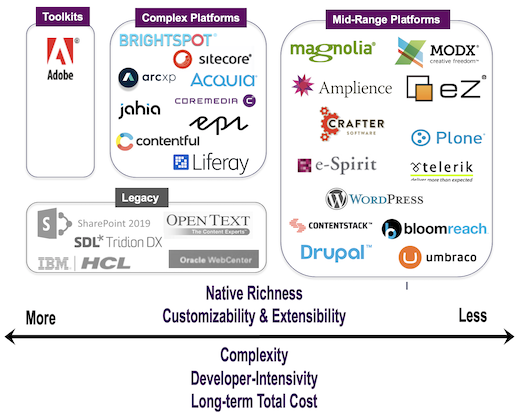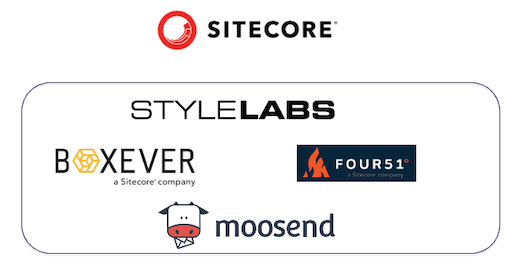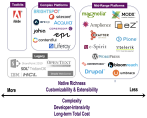Whither Sitecore Now?
Five years ago in these pages I puzzled through the paradox facing Web Content Management vendor Sitecore as the myth of a monolithic "DX Platform" receded. After updating the piece in 2020, the following year it became clear that Sitecore had finally made a choice for its future direction, as it all but deprecated its flagship "XP" offering in favor of a series of more composable (and mostly cloud-based) offerings.
Amid rumors of pending M&A activity, it seems time for an update, and an answer to the question: what is Sitecore, really, circa 2023?
Four Business Parts
To be fair, at RSG we don't have any inside scoop on whether Sitecore is for sale or not. Private Equity owners test the waters all the time. Moreover, I think the core of the firm is stable enough to withstand some turbulence. With the same breath, let's point out that this vendor is likely no longer a major growth play. The transition from growth to margins in the software world can be bumpy. Perhaps Sitecore will attract a different kind of backer.
But that begs the question: what does Sitecore really have to offer? In looking over the firm, I see a historic strength in software development that has dissipated somewhat in recent years into what are really four distinct parts to the business.
1. Legacy XP Support
A huge legacy install base of the flagship XP system remains, and generates an enormous amount of services work (mostly for implementation partners) and some managed hosting revenues (mostly for Sitecore and Microsoft).
The volume of money spent on this work caused one friend to speculate that Sitecore could be acquired by a large professional services firm, the same way HCL acquired much of IBM's MarTech portfolio. This seems unlikely to me, since development on a legacy platform seems like a wasting asset, and it would be difficult to displace the incumbent Sitecore partners doing this work now. But who knows.
2. XM Cloud
The company is banking its future on this somewhat newer, lighter, cloud-based version of its CMS. XM Cloud remains a work in progress and unlikely to garner many new licensees, but still presents a something of a lifeline to diehard Sitecore licensees looking to transition beyond XP. Note that XM Cloud represents something of a "tweener" -- not as complex as XP to deploy, but not as richly customizable as well. At RSG we can't tell yet if this will become the best or worst of both worlds, but I do know one thing: I've never seen a WCM vendor successfully go downmarket like this before.

3. Content Hub
RSG closely reviews Content Hub separately in both our DAM and OCP evaluation streams. It's a more modern, cloud-native platform that Sitecore has not stewarded very well since purchasing it from Stylelabs five years ago. Still, it has attracted a fairly loyal following and frequently beats out Adobe and other contenders in head-to-head DAM selection projects. There's likely long-term value here.
4. SaaS Add-ons
What Sitecore now calls "Engagement Cloud" and "Commerce Cloud" stem from some 2019 acquisitions of several SMB-focused SaaS platforms, most notably Boxever CDP, Moosend Marketing Automation, and Four51 Ecommerce platform.

There's nothing particularly special about these platforms, except they gave Sitecore more to sell, especially as the vendor dropped some similar features in the step-down from XP to XM Cloud. It's never been clear to us that the whole here is greater than the sum of its parts, and that's what these are...parts.
What You Should Do
Let's not worry about current of future Sitecore investors. Let's focus on you. If you don't license Sitecore for Web CMS now, at RSG we would advise taking some pause to see what happens with XM Cloud. Today it represents a kind of hybrid between the old and the new Sitecore. That could present a hopeful fusion, or potentially a prohibitively difficult stretch.
(You can see our deeper take on XM Cloud as it's the free chapter available as a sample in our broader WCM evaluation report, which evaluates more than two-dozen platforms.)
If you license Sitecore XP today, don't automatically transition to XM Cloud (plus the add-on modules). Take your time to review your web publishing operation and consider the raft of marketplace options -- some lighter and more modern -- before taking on the hard work and additional expense of converting to Sitecore's new product models.
If you license Content Hub or one of Sitecore's other add-ons, and it's working well for you, you can probably just sit tight.








